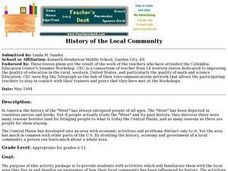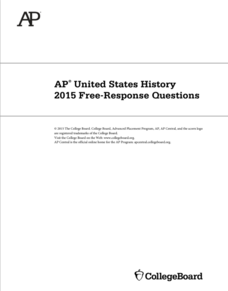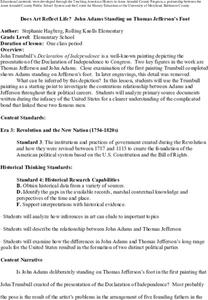Curated OER
The Constitutional Convention: Four Founding Fathers You May Never Have Met
Middle schoolers read biographies of their assigned Founding Father. They present an oral argument that their assignee deserves to be better known by making connections between regional politics and postions defined by character.
Curated OER
The Federalist Debates: Balancing Power Between State and Federal Governments
Students examine the pros and cons of state sovereignty vs. federalism, as argued by the Founding Fathers. They identify the basic positions of each side, complete a worksheet, and write a persuasive essay arguing for Jefferson or Hamilton.
Shell Education
Leaders from the 1790s
The Founding Fathers contributed to the United States in many ways. Class members explore various Founding Fathers through research, group work, and realia. The final product of group work are posters and artistic representations of...
Curated OER
The Constitutional Convention: What the Founding Fathers Said
Students list some ideas proposed and debated during the Constitutional Convention, and discuss the important issues requiring compromise during the Constitutional Convention.
Curated OER
What Experiences Shaped the Founders' Thinking about Government?
Students study the ideas and experiences that shaped the founding fathers' perspective about government. In this the government lesson plan, students examine the Articles of Confederation as they relate to the power of government....
PBS
Alexander Hamilton: Lawyer, Writer, and Founding Father
Scholars analyze the impact Alexander Hamilton had on the creation of the United States. Primary documents and video clips give learners a glimpse into the life of one of America's Founding Fathers, arming them with enough information to...
Curated OER
Creating a Bill of Rights
Creating a Bill of Rights isn't easy! Help your scholars experience what the Founding Fathers did by challenging them to write a Bill of Rights. Groups pretend they are a new democratic country and proceed to create that country's Bill...
Center for History Education
The Founding Fathers and the Constitutional Struggle Over Centralized Power
Believe it or not, the Constitution was America's second attempt at a democratic government. Academics travel back to the past to explore the shortcomings of the Articles of Confederation that would eventually lead to the Constitutional...
Mr. Nussbaum
THE Founding Father
Who is the founding father—George Washington, Thomas Jefferson, or Benjamin Franklin? Scholars decide which of three early Americans, should be crowned the founding father of America based on research. Then, they compose a persuasive...
Bill of Rights Institute
Preserving the Bill of Rights
Consider how America's founding fathers and their experiences contributed to the rights we all enjoy today. A collection of reading, writing, and collaborative exercises prompt high schoolers to think about the ways their current lives...
PBS
Benjamin Franklin: Writer, Inventor, and Founding Father
Imagine being a writer, inventor, businessman, and the founding father of an entire nation! Pupils analyze the life and activities of Benjamin Franklin. Primary documents, videos, and paintings open up the world of Franklin to young...
Core Knowledge Foundation
A New Nation American Independence Tell It Again!™ Read-Aloud Anthology
Sixteen lessons make up a read-aloud anthology centered around America's journey toward independence. Scholars hear texts about the Boston Tea Party, Betsy Ross, the Found Fathers, the Liberty Bell, and more! Pupils discuss their...
Curated OER
History of the Local Community
Students research their local communities and identify the founding fathers of their city and county. In this communities lesson plan, students research using the library and internet. Students also interview citizens who have lived in...
National Endowment for the Humanities
Slavery and the American Founding: The "Inconsistency Not to Be Excused"
High schoolers examine slavery in the revolutionary and colonial eras of the United States. In this slavery lesson, students investigate the presence of slavery in early America, the language of the Constitution, and the intent of the...
Ashbrook Center at Ashland University
Ratification of the Constitution
How difficult was it to get everyone to agree on the contents of the Constitution? Historians analyze the task of the Founding Fathers in creating the United States Constitution. They research a directory of video clips, primary sources,...
College Board
2015 AP® United States History Free-Response Questions
How do preservationists and conservationists differ? How did the Founding Fathers come to understand the American Revolution? Learners explore the queries and more using authentic College Board materials to prep for upcoming exams.
DocsTeach
Excerpts from the Declaration of Independence
What exactly did the Founding Fathers declare? Elementary historians delve into the Declaration of Independence in a fast-paced activity. The resource provides text experts and guided questions to help academics analyze the intent of the...
Center for History Education
Why is John Adams Standing on Thomas Jefferson's Foot?
Was it a bromance, or were they frenemies? Young historians use a controversial portrait and letters between Thomas Jefferson, John Adams, and others to evaluate the relationship between the two Founding Fathers. Examining the primary...
Curated OER
The Constitutional Convention: Four Founding Fathers You May Never Have Met
Young scholars study the biographies of Ellsworth, Hamilton, Paterson, and Randolph. They study roles of these men during the Constitutional Convention.
National Endowment for the Humanities
The "To Do List" of the Continental Congress
What is on your to-do list today? The second lesson of a three-part series on Lost Heroes of America investigates the laundry list of items in front of the second Continental Congress. Scholars research, analyze, and present information...
National Endowment for the Humanities
Lost Hero: Was John Hanson Actually the First President?
The first president of the United States was ... John Hanson? Scholars investigate the notion that the initial leader of the nation was not George Washington. Using research, articles, and open discussion, individuals create a quest for...
National Endowment for the Humanities
Chief Executives Compared: The Federalist Papers
Delve into the responsibilities of the president by looking at President Hamilton's opinion of the presidential office in his own words. The second in a three-part series, the resource also offers an interesting compare-and-contrast...
Curated OER
Citizens Together
Students examine the bill of rights as it relates to founding documents and their significance today. In this bill of rights lesson plan, students use newspapers as sources to answer critical questions regarding democratic citizenship....
Curated OER
Documents and Symbols and American Freedom
Students complete a unit of lessons on the documents, symbols, and famous people involved in the founding of the U.S. government. They create a personal bill of rights, write a found poem, design a flag, conduct research, and role-play...
Other popular searches
- Our Founding Fathers
- Founding Fathers Game
- The Founding Fathers
- Bible and Founding Fathers
- Founding Fathers Project
- Founding Fathers Debate
- Founding Fathers Art
- Founding Fathers Fame
- Founding Fathers Gfame
- Founding Fathers Ideals
- Founding Fathers of Us

























